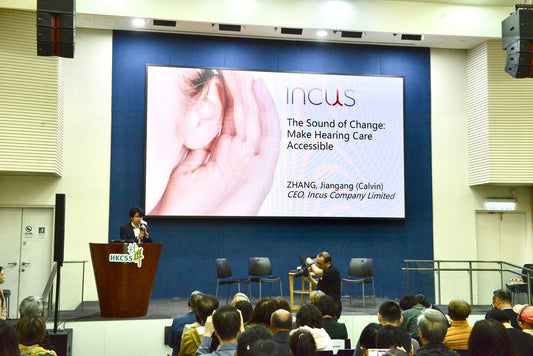Do sounds feel hollow - as if they are produced in a barrel - when wearing earplugs, earphones or hearing aids? Is your own voice loud? Or do you hear boomy sounds when walking or chewing? Perhaps your ears feel clogged or pressured? If you answered yes to at least one of the above, then you are likely experiencing the occlusion effect.
The Occlusion Effect And Its Causes
The occlusion effect occurs when low-frequency sounds are trapped within your ear canals. Tightly-fitting earplugs, earphones or hearing aids can partially or fully block your ear canals. The blockage prevents sounds from escaping the ear and causes them to bounce around in the ear canal, eventually reaching your eardrums and causing you to hear hollow and booming sounds for a while.
But where do the sounds that end up getting trapped originate?
If you are wearing earplugs or earphones, the sounds are caused by vibrations in the skull when chewing, swallowing, walking, or talking. Sometimes, the cause could even be your heartbeats.
If you are wearing hearing aids, they will feed amplified sounds into your ears. Because hearing aids are inserted deeply into the ear and produce loud sounds, it is common to feel occluded when wearing them.
While the occlusion effect is a common culprit causing us to be uncomfortable with the sound of our own voice, it is not the only cause.
Amplusion: Occlusion May Not Be the Whole Story
Occlusion may not be the only cause of your own voice sounding unnatural.
If you are wearing hearing aids with amplification functions, the amplification might interrupt your ability to tune the volume of your own voice.
Because the microphones on hearing aids are close to your mouth, your voice will produce a strong signal. If your hearing aids indiscriminately amplify your voice as if it was someone else's, it will sound overwhelmingly loud and unnatural. At the same time, other people will not hear you clearly if you do not speak loudly enough.
Sometimes, experiencing both amplification and occlusion simultaneously is referred to as amplusion (amplification + occlusion).
If you remain sensitive to low-frequency sounds but suffer from a relatively large hearing loss at high frequencies, then you are at risk of a more severe and annoying feeling of occlusion.
Solutions To Occlusion And Amplusion
How To Reduce the Occlusion Effect
Starting from the understanding that the occlusion effect is a sign of sounds trapped in the ear canal, there are various ways to reduce the occlusion effect or manage the discomfort it causes depending on what type of device you are using:
- In-ear earphones: Adjust the physical fit of the earphones by switching to a different size or type, or by adjusting how the earphones sit in the ear canal. Since our ears can have a wide range of shapes and dimensions, the default eartips provided by the manufacturer might not be suitable for you.
- Over-the-ear headphones: If your headphones allow, you could experiment with adjusting the headband (the part of the headphones that sits on top of the head and connects the two sides).
- Hearing aids: If you are using occluding eartips, switching to a different size or to open-fit, vented or hybrid eartips could provide more relief. However, switching eartips is not always suitable, especially if the hearing aid does not manage acoustic feedback well, or if you need strong amplification. If you are using an earmold, you could seek your hearing care professional to see whether they could make adjustments.
Besides, you may try the following tips regardless of what device you have:
- Take breaks to help relieve the pressure on your ears.
- Practice good ear hygiene: Keep your ears clean and free of excess earwax.
- If you experience strong discomfort or pain while wearing hearing aids, earphones or earplugs, it is important to talk to your audiologist or healthcare provider. They can help you determine the best way to manage the occlusion effect and prevent further discomfort or potential hearing loss.
New Technology Reduces Occlusion And Amplusion
As mentioned, hearing aid wearers often experience amplusion, referring to the effects of simultaneous occlusion and amplification of their own voice. Hearing aid wears often complain about hearing their own voice too loudly, and do not like the effects hearing aids can have on their own voice, such as distortion.
Researchers at Incus have invented a new technology to automatically reduce the perceived loudness of your own voice. Knowing that the bones surrounding the ear canal will vibrate slightly when you are talking, they have placed vibration sensors in the earpiece of the hearing device to detect your speech.
Their novel algorithms sense when you are speaking, and by comparing the signals picked up by the vibration sensors to the sounds in the environment (picked up by omnidirectional air-conduction microphones), they are able to reduce the volume of your own voice without negatively impacting your ability to hear others.
This technique, which the researchers call Own Voice Cancellation, works automatically with high accuracy and is especially useful for first-time users who are trying to get used to what it feels like to suddenly hear the world clearly. Own Voice Cancellation is now available to be experienced in their latest hearing device.
How Hybrid Eartips And Elite Acoustic Feedback Cancellation Technology Reduce Occlusion Without Compromising Sound Quality
Researchers at Incus also learnt that hearing aid wearers would report their ears feeling clogged, especially with new hearing aids equipped with closed-fit eartips or earmolds. Some manufacturers provide eartips without occlusion effect with open or vented designs, but those have drawbacks.
When using open or vented eartips, hearing aids become prone to producing acoustic feedback (howling or screeching sounds), which either leads to an unbearable experience or forces the wearer to greatly reduce the volume, in which case they cannot hear clearly.
Besides, the wearer may not be able to enjoy low-frequency sounds, such as the bass in music, because the energy would leak out rather than reach the eardrum.
The researchers at Incus realised that existing eartip designs involved trade-offs: comfort vs sound quality.
Being experts in acoustics, they hypothesized it would be possible to carefully design eartips that are comfortable without sacrificing sound quality.
They went through countless iterations, testing different materials and venting mechanisms. Prototypes were distributed. Ears were measured. Surveys were completed.
At last, they arrived at what they call Hybrid Eartips: ear-conforming and skin-friendly eartips with superior wearing comfort and a secure fit. These eartips let air pressure escape via a proprietary venting mechanism to avoid a stuffed feeling while lowering ambient noise, preventing acoustic feedback and yielding rich sound across the range.
However, no design is perfect. There will always be scenarios where sound could leak out from the ear canal and reach the sensitive microphones of a hearing device.
Fortunately, the researchers also had another trick up their sleeve: elite acoustic feedback cancellation technology. Using sophisticated digital signal processing (DSP) techniques, they created algorithms to detect the pre-conditions for acoustic feedback and pre-emptively tackle it. Thanks to this technology, hearing device wearers do not have to be anxious about sudden loud screeching sounds. The Hybrid Eartips and acoustic feedback cancellation technology are included with the latest Incus hearing device.
This Factor Is Associated with the Occlusion Effect
Having reviewed research literature on the occlusion effect, we have concluded that the occlusion effect is associated with the frequencies where someone is suffering from a hearing loss.
People with good low-frequency hearing are more likely to suffer from the occlusion effect. The frequency range where the occlusion effect occurs is between 250 and 500 Hz. If you are more sensitive to the lower frequency sounds, then you will perceive that sound more often, causing occlusion.
On the other hand, if you have hearing loss at low frequencies, you are less likely to experience occlusion as the sound may not be loud enough for you to perceive.
Most hearing loss patients would use hearing aids that amplify all sounds, even for low-frequency bone-conducted sounds.
If the wearer is more sensitive to the low-frequency sounds, then he will perceive the amplified sound more strongly, causing the constant loud, hollow noise of the occlusion effect. The more the sound the amplified, the worse the occlusion effect gets, making it unbearable for some hearing aid users.
Can The Occlusion Effect Damage Hearing?
The occlusion effect itself does not directly cause hearing loss. However, if the occlusion effect is not managed properly, it could lead to other issues that may cause hearing loss:
- Improperly fitted hearing aids or earplugs: If the hearing aids or earplugs are not fitted properly, they can cause pressure on the ear canal, which can lead to a buildup of earwax or an infection. If left untreated, these conditions can cause temporary hearing loss.
- Prolonged use of hearing aids or earplugs: Prolonged use of hearing aids or earplugs can lead to a buildup of earwax or an infection. This can cause temporary hearing loss if it is not managed properly.
Improving Music with Occlusion
Occlusion isn’t all bad. For music enjoyers, occlusion may actually improve the sound quality.
Since low-frequency sounds are trapped during occlusion, sounds of instruments with low frequency such as drums or bass will remain longer. This can make music even more enjoyable. Let’s say you want to enjoy the soft bass sound in a song, having occlusion can highlight the bass sound, making it more hearable. Products with active noise cancellation (ANC), such as Apple’s AirPods Pro, commonly cause the occlusion effect. The working principle behind ANC technology is that they generate sound waves to cancel out noise. These sound waves may create a feeling of pressure in the ears. In addition, they create a seal between the earphone and the ear canal to prevent noise from entering the ear, but this also prevents pressure from being released.



